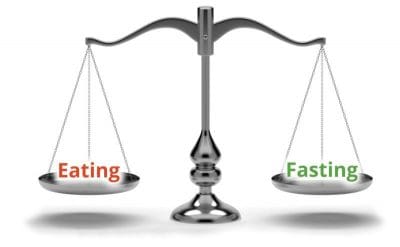Intermittent fasting is one of the most ancient secrets of health and wellness. Because it's been practiced throughout all history. Intermittent fasting is considered a secret because this habit had been long forgotten.
But now, many people are re-discovering this dietary intervention. It may carry advantages if it is done correctly, including: reversal of type two diabetes, weight reduction, greater energy and many other things. In this beginner's guide you can learn the function of intermittent fasting on the body.
How Does Intermittent Fasting Work?
At its very core, fasting simply allows the body to burn off extra body fat. It is necessary to realize that this is ordinary for humans and people have evolved to avoid negative health consequences from it. Body fat is merely food energy that's been stored away. If you do not consume food, your body will simply "eat" its own fat for energy.
Life is all about balance. The good and the bad. The yin and the yang. The same is applicable to fasting and ingestion. Fasting, after all, is simply the flip side of eating. If you aren't eating, you're fasting. Here is how it works:
Once we eat, more food energy is consumed than can immediately be used. Some of the energy must be stored away for later usage. Insulin is the hormone involved with the storage of food energy.

Insulin rises when we consume food, helping to keep the excess energy in two separate ways. Sugars can be connected into chains, called glycogen and stored in the liver. There is limited storage space; and the liver starts to turn the glucose into fat, after that is achieved. This procedure is called De-Novo Lipogenesis.
A number of the newly created fat is stored in the liver, but most of it is exported into additional fat deposits within the body. Even though this is a complex procedure, there is no limitation to the total amount of fat which can be created. Therefore, two complementary food energy storage systems exist within our own bodies. One is readily accessible but with limited storage area (glycogen), and the other is more challenging to access but has infinite storage area (body fat).

The method goes in reverse when we don't eat (fasting). Insulin levels fall, signaling the body to start burning stored energy as no more is coming through food. Blood glucose falls, so the body has to pull sugar to burn for energy.
Glycogen is the most readily accessible energy resource. It's broken down to give energy to the cells. This provides enough energy to power the body for 24-36 hours. After that, your system will begin breaking down fat for energy.
So, the body just really exists in two states, the fed (insulin high) condition and the fasted (insulin reduced) state. Either we are storing food energy, or it is burning food energy. It is one or another. Then there is not any weight gain if fasting and eating become more balanced.
If we start eating the moment we roll out of bed, and do not stop until we go to sleep, we spend almost all our time at the fed state. As time passes, we will gain weight. We have not allowed our body some time.

To restore balance or to lose weight, we simply need to boost the quantity of time we burn food energy (fasting). Essentially, fasting enables the body to use its energy that is stored. After all, that is what it is there for. The important thing to realize is that there isn't anything wrong with that. That's how our bodies are designed. That's what cat, dogs, lions and bears do. That's what humans do.
If you are constantly eating, as is frequently advocated, then your body will simply utilize the incoming food energy rather than burn the body fat. It'll be only stored by you. It will be saved by your own body for a while when there's nothing to consume. You lack equilibrium. You lack fasting.
Fasting is Not Starvation
Fasting differs from starvation in a crucial way. Control. Starvation is the involuntary lack of food. It's neither deliberate nor controlled. Fasting, on the other hand, is the voluntary withholding of food for health spiritual, or other factors.
Food is readily accessible, but you opt not to eat it. This could be for any time period, from a couple of hours up to days or even weeks. You will begin a fast and it may be ended by you at will. You may start or stop a fast for any reason or no reason at all.
Fasting has no typical length, as it's merely the lack of ingestion. Anytime that you aren't eating, you are fasting. As an instance, you may fast a period of approximately 12-14 hours, between breakfast and dinner the next day. In that sense, fasting ought to be thought of as a part of life.
Fasting is but a part of regular, normal life. It is possibly the oldest and most powerful dietary intervention imaginable. Yet somehow we have forgotten its power and discounted its potential.
 The scope of our information is limited to chiropractic and spinal injuries and conditions. To discuss options on the subject matter, please feel free to ask Dr. Jimenez or contact us at 915-850-0900 .
The scope of our information is limited to chiropractic and spinal injuries and conditions. To discuss options on the subject matter, please feel free to ask Dr. Jimenez or contact us at 915-850-0900 .By Dr. Alex Jimenez
Additional Topics: Wellness
Overall health and wellness are essential towards maintaining the proper mental and physical balance in the body. From eating a balanced nutrition as well as exercising and participating in physical activities, to sleeping a healthy amount of time on a regular basis, following the best health and wellness tips can ultimately help maintain overall well-being. Eating plenty of fruits and vegetables can go a long way towards helping people become healthy.





